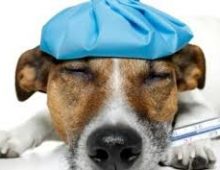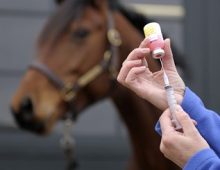Category Archives: Pets
Rabies is Incurable?!?
Rabies is a zoonotic disease, meaning it can be transmitted between people and animals. Wildlife like bats, skunks, and raccoons are some of the most common carriers of the disease. Infection occurs when saliva of the infected animal enters the bloodstream of another mammal (this is often from a bite). The disease can take weeks to months to develop symptoms, but once they develop the disease is fatal. Recent confirmed cases of rabies in bats in Ashland and Bayfield Counties have been documented. Please consider the following steps to protect yourself from this deadly disease:
•Keep your pets current on their rabies vaccination. It is only legally required in dogs, but highly recommend in other species (cats, horses, etc.). Not only will this protect your pet from rabies, but in turn it protects you from being exposed to rabies from your own pet.
•Keep your distance from mammalian wildlife, especially any exhibiting abnormal or sickly behavior (ex. a skunk roaming during daylight, a bat acting weak and sick)
•If you are bit by mammalian wildlife contact your local health department. They will direct you on how to submit the animal for rabies testing, if necessary. Only collect the animal if it can be done safely, and try to avoid damaging the head. If you cannot collect the animal, you should still contact your local health department for further instructions.
•If you find a bat in your house contact your local health department. Bat bites can often go unnoticed while you are sleeping. The health department will direct you on how to submit the animal for rabies testing, if necessary. Dr. Sarah Myers, Willow Animal Hospital
(photo courtesy of: www.delavanlakesvet.com)
TICKS: Beyond Lyme Disease & "Ewww!"
If you have lived in northern Wisconsin long enough you probably have run into a tick or two, or hundreds. You may be familiar with the most common risk with ticks as carriers of Lyme disease. Here are some things you may not know about tick diseases:
•The ticks in our area can carry many diseases that can effect both people and pets (Lyme, Anaplasmosis, Ehrlichiosis, and Rocky Mountain Spotted Fever are some of the most common)
•Of the many tick diseases, only Lyme disease has an available vaccine for dogs
•No vaccine (including the Lyme vaccine) is 100% effective at preventing diseases
•A multimodal approach to tick disease prevention is considered the most effective at keeping your pets safe (Lyme vaccine, topical or oral tick prevention products, daily tick checking, avoiding wooded or long grass areas during peak tick season)
•It can sometimes take several months after a tick bite for disease symptoms to develop
•Symptoms of tick diseases can include lethargy, anorexia, lameness, swollen painful joints, high fever
•The classic “bullseye” appearance of a tick bite that is described in people with Lyme disease is not typically seen in dogs
•Many tick disease infections carry a good prognosis if treated promptly and with the entire course of prescribed antibiotics
•Some tick disease infections can cause very serious side effects that may be fatal (ex. Lyme disease in some dogs can lead to a potentially fatal kidney failure)
Call us if you have other questions about tick diseases! Dr. Sarah Myers, Willow Animal Hospital
(photo courtesy of: www.pvguide.org)
Click HERE for 5 ways to protect your pet from Lyme disease.
Click HERE to learn more about protecting yourself & your family from Lyme disease.
Protect Your Horse With Vaccinations
Every spring questions arise regarding equine vaccination. What does my horse need? When should it be given? And others. Let me share some thoughts that may help you vaccinate your horse appropriately:
Many horses carry the Tetanus organism in their intestinal tract where it does no harm. However, their manure then serves as a source of this bacteria, which is dangerous if it enters the body through a wound. Thus, horses are especially prone to exposure to tetanus and all should receive an annual Tetanus toxoid vaccine. It makes no difference if your horse has exposure to other horses.
In like manner, there is a group of three diseases that are carried by birds and then spread from the bird to your horse via mosquitoes. Your horse can be infected by these agents even if it is totally isolated, simply because there are birds and mosquitoes everywhere.
These three agents/viruses are:
1) Eastern Encephalomyelitis (“Sleeping Sickness”)
2) Western Encephalomyelitis
3) West Nile
I recommend that all horses be vaccinated for these three agents, as well as Tetanus.
All the other vaccines out there are not quite so simple and require some decision-making. One question that I ask is, “Will your horse be exposed to other horses?” If you plan to travel to the fair, horse shows, etc. you should protect your horse against the diseases that spread from horse to horse. These include Rhinopneumonitis and Influenza. Immunity to these agents may not be long-lasting, so plan to vaccinate a month before exposure and/or consider a mid-season booster if your show season is long. Young horses (less than 6 years old) are also susceptible to “Strangles” (Streptococcus Equi). Rabies vaccine is also given to a very small percentage of horses in this area, despite our very low risk.
Beyond that, there are a number of other vaccines available (i.e. Equine Arteritis, Anthrax, Botulism, and Potomac Horse Fever) that are not routine at all for local horses, but may be helpful in special situations involving travel.
Dr. Steve Meyer, Willow Animal Hospital (photo courtesy of: www.thehorse.com
Heartworm Disease is SERIOUS
Heartworm disease is a condition where parasitic worms take residence in the heart. That can result in congestive heart failure and death. It is most likely to affect dogs, but very rarely cats can be infected too. The microfilaria stage of the disease is transmitted by mosquitoes. Once inside their host, the microfilaria develop into adult worms that inhabit the heart. The disease is less common in our area (northern Wisconsin) but we still see cases. Dogs that travel to southern Wisconsin or other warmer states are at a much higher risk. The disease is preventable with a relatively inexpensive and safe monthly heartworm prevention pill. If your dog does contract heartworm disease, early detection can allow for treatment, but at considerable expense and with some risks of serious side effects from the treatment. Advanced stages of heartworm disease are often fatal despite any attempts at treatment. Please schedule an appointment if you would like to learn more about testing or prevention for heartworm disease. Dr. Sarah Myers, Willow Animal Hospital
(photo courtesy of: www.whitecloudvet.com)
Help! My Pet Has Bad Breath!!
February is National Dental Health month! Pets need dental care just as much as we do. Here are some common questions and answers about periodontal disease.
What are some signs of dental disease in my pet?
•Foul smelling breath, brown tartar accumulation on the teeth, food falling out of the mouth when chewing, and inability or difficulty eating hard food are some common signs. Some pets exhibit no signs at all.
What should I do if I think my pet has dental disease?
•Schedule an appointment to consult with your veterinarian. Often they will recommend a dental cleaning just like we get done at the dentist.
How do I prevent dental disease in my pet?
•Yearly or biannual dental cleanings are most effective at preventing and treating disease, but there are some at home products available to help decrease the frequency of cleanings. When you are looking for products to help prevent dental disease, look for the Veterinary Oral Health Council (VOHC) seal of approval. This ensures that veterinarians have studied the product and believe that it actually works. Products (in order of most effective to least effective) include: prescription dental diets, pet toothbrushes and toothpaste, dental chews, and dental sprays. These products are most effective when used on a daily basis. Dr. Sarah Myers, Willow Animal Hospital
(photo courtesy of: www.bmpah.com)
I miss you, my friend...
It is completely normal to feel devastated when your beloved pet dies. Everyone grieves differently, so here are some tips to help with your loss.
•The grieving process happens gradually so be patient with yourself and allow yourself to heal at your pace.
•It is normal to feel sad, frightened or lonely in response to the loss of your pet.
•Do not ignore your pain as this will make it worse in the long run. Talk to others about what you are feeling. Professional help is often a good option.
•Reach out to others that have lost pets (online message boards, pet loss hotlines, pet loss support groups).
•Rituals like holding a funeral for your pet can be very helpful for closure and a chance to share feelings with your family members.
•Creating a legacy for your pet can be a way to help remember the fun and love you shared with your pet (ex. preparing a memorial, planting a tree, making a scrapbook of pictures).
•Maintenance of your normal routine will make it easier for you and any other remaining pets. Dr. Sarah Myers, Willow Animal Hospital
(photo courtesy of: www.k9ofmine.com)
Merry Christmas!!!
Merry Christmas, from the doctors and staff at Willow Animal Hospital
Thank you for your business and friendship! May you feel God’s blessing during this holiday season, and have a new year that is full of hope and joy. (photo courtesy of: www.pinterest.com)
2016 Vaccination Clinics
Our vaccination clinics offer a closer-to-home option for keeping up on your dog or cat’s routine vaccinations. We visit Oulu, Port Wing, Cornucopia, Maple, Brule, Mason and Mellen annually (just in time for dog licensing). Stop by for annual heartworm and tick-borne diseases testing/prevention, internal parasite treatment/prevention, and discounted vaccinations for your faithful pets!
See our website for more information about dates, times and locations. (photo courtesy of: www.lakewood.org)
I'm just fluffy!!
One of the most common medical condition we see in our domestic dogs and cats is obesity. Certain medical conditions can contribute to obesity, like hypothyroidism (low thyroid levels) and hyperadrenocorticism (high blood cortisol levels). Obesity can make certain medical conditions more likely and difficult to manage. Most of our pets simply need a diet change in order to prevent obesity. Here are a few diet tips to help prevent obesity in your pet:
• Start thinking about weight management when your pet is young. It’s much easier to keep your pet at a healthy Body Condition Score (see links below) than to lose weight later.
• Feed your pet a quantity of food that maintains a good Body Condition Score, not the amount listed on the back of your food bag. Depending on your pet’s activity level, most feeding chart guidelines will lead to overfeeding and obesity.
• Feed your pet meals of specific and consistent amounts. Free feeding your pet as much as they are willing to eat very often results in overfeeding and obesity. When you know exactly how much they are getting you can then monitor for changes in their Body Condition Score and make appropriate adjustments to fit their needs.
• The amount of food your pet needs will change over time, so make adjustments in order to maintain a good Body Condition Score. Feeding needs will often decrease as pets become aged, after getting spayed or neutered, in hot environments, and when pets are less active.
• Visit these links to learn about how to evaluate Body Condition Score in your pet.
Dogs: http://www.petmd.com/sites/default/files/bcs-dog.jpg
Cats: http://www.petmd.com/sites/default/files/bcs-cat.jpg
Dr. Sarah Myers, Willow Animal Hospital
(photo courtesy of: petattack.com)
Allergies?
Do you think your pet has a food allergy? Food allergies can cause both allergic skin disease and gastro-intestinal problems. Symptoms of allergic skin disease include scratching or licking the skin which can result in poor coat quality, hair loss and skin infections. Gastrointestinal symptoms of food allergies in-clude vomiting and diarrhea. Diagnosis of a food allergy involves consultation with your veterinarian and a food allergy elimination diet trial. Dr. Sarah Myers, Willow Animal Hospital
(photo courtesy of: expertbeacon.com)
















